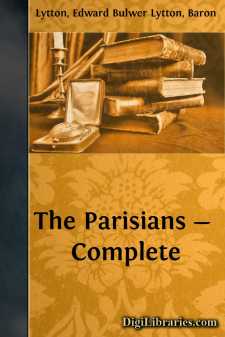Categories
- Antiques & Collectibles 13
- Architecture 36
- Art 48
- Bibles 22
- Biography & Autobiography 813
- Body, Mind & Spirit 142
- Business & Economics 28
- Children's Books 15
- Children's Fiction 12
- Computers 4
- Cooking 94
- Crafts & Hobbies 4
- Drama 346
- Education 46
- Family & Relationships 57
- Fiction 11829
- Games 19
- Gardening 17
- Health & Fitness 34
- History 1377
- House & Home 1
- Humor 147
- Juvenile Fiction 1873
- Juvenile Nonfiction 202
- Language Arts & Disciplines 88
- Law 16
- Literary Collections 686
- Literary Criticism 179
- Mathematics 13
- Medical 41
- Music 40
- Nature 179
- Non-Classifiable 1768
- Performing Arts 7
- Periodicals 1453
- Philosophy 64
- Photography 2
- Poetry 896
- Political Science 203
- Psychology 42
- Reference 154
- Religion 513
- Science 126
- Self-Help 84
- Social Science 81
- Sports & Recreation 34
- Study Aids 3
- Technology & Engineering 59
- Transportation 23
- Travel 463
- True Crime 29
The Parisians - Complete
Description:
Excerpt
CHAPTER I.
It was a bright day in the early spring of 1869. All Paris seemed to have turned out to enjoy itself. The Tuileries, the Champs Elysees, the Bois de Boulogne, swarmed with idlers. A stranger might have wondered where Toil was at work, and in what nook Poverty lurked concealed. A millionaire from the London Exchange, as he looked round on the magasins, the equipages, the dresses of the women; as he inquired the prices in the shops and the rent of apartments,—might have asked himself, in envious wonder, How on earth do those gay Parisians live? What is their fortune? Where does it come from?
As the day declined, many of the scattered loungers crowded into the Boulevards; the cafes and restaurants began to light up.
About this time a young man, who might be some five or six and twenty, was walking along the Boulevard des Italiens, heeding little the throng through which he glided his solitary way: there was that in his aspect and bearing which caught attention. He looked a somebody; but though unmistakably a Frenchman, not a Parisian. His dress was not in the prevailing mode: to a practised eye it betrayed the taste and the cut of a provincial tailor. His gait was not that of the Parisian,—less lounging, more stately; and, unlike the Parisian, he seemed indifferent to the gaze of others.
Nevertheless there was about him that air of dignity or distinction which those who are reared from their cradle in the pride of birth acquire so unconsciously that it seems hereditary and inborn. It must also be confessed that the young man himself was endowed with a considerable share of that nobility which Nature capriciously distributes among her favourites with little respect for their pedigree and blazon, the nobility of form and face. He was tall and well shaped, with graceful length of limb and fall of shoulders; his face was handsome, of the purest type of French masculine beauty,—the nose inclined to be aquiline, and delicately thin, with finely-cut open nostrils; the complexion clear,—the eyes large, of a light hazel, with dark lashes,—the hair of a chestnut brown, with no tint of auburn,—the beard and mustache a shade darker, clipped short, not disguising the outline of lips, which were now compressed, as if smiles had of late been unfamiliar to them; yet such compression did not seem in harmony with the physiognomical character of their formation, which was that assigned by Lavater to temperaments easily moved to gayety and pleasure.
Another man, about his own age, coming quickly out of one of the streets of the Chausee d'Antin, brushed close by the stately pedestrian above described, caught sight of his countenance, stopped short, and exclaimed, "Alain!" The person thus abruptly accosted turned his eye tranquilly on the eager face, of which all the lower part was enveloped in black beard; and slightly lifting his hat, with a gesture of the head that implied, "Sir, you are mistaken; I have not the honour to know you," continued his slow indifferent way....












